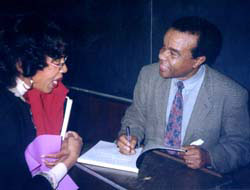David Driskell: Contemporary Issues in African-American Art
Recently, "Conversations Across Cultures: Sharing Histories-Artists of Africa and the Americas," a weekend course, brought together leading black artists, historians and TC students to discuss the cultural connections shared by these continents through contemporary arts practice.
The keynote speaker was artist and University of Maryland Distinguished Professor Emeritus of Art David Driskell, "the world's leading curator, collector, and scholar of works by African Americans," according to Pamela Newkirk from ArtNews.
In Driskell's speech, he focused on "Contemporary Issues in African American Art," including visual and performing arts as teaching tools, an examination of history literature and influencing texts, and implementing a more diverse curriculum. He also discussed holding museums responsible for building collections that mirror the diverse populations they serve in urban communities as well as invite more participation from all parts of the community to make sure there is "equitable education in the arts."
He said,"When such an equitable system of creative learning is in place, particularly one that takes into account the simple prescription of redefining our cultural likeness rather than our differences, within a short span of time we shall see more clearly the varied cultural ingredients that go into the making of our rich creative temperament in the visual arts in America."
His career began to take shape in 1952, when he was a sophomore at Howard University studying painting and history. Professor James A. Porter, a scholar of African-American art, encouraged Driskell to change his focus to art history. Porter encouraged Driskell to show people what African Americans have contributed to art.
Although he continued to paint, he listened to Porter who had introduced him to Aaron Douglas, Henry Ossawa Tanner and William H. Johnson-before their reputations were firmly established. Also, Driskell apprenticed at the Howard University Gallery of Art, which was founded by James V. Herring, another of his professors. It was Herring who helped to instill in Driskell the passion for collecting and curating art.
He has received nine honorary degrees and curated more than 35 exhibitions of works by black masters, including Jacob Lawrence, Romare Bearden, and Elizabeth Catlett. In 1972, he organized a Johnson retrospective for the Smithsonian Institution's National Museum of American Art in Washington DC.
In 1996, Driskell advised the White House on its first purchase of a work by a black artist. He also advised Oprah Winfrey and is currently the curator for Bill Cosby's collection. Since 1998 some of his own collection, called "Narratives of African American Art," has been traveling to museums nationwide.
Also an exhibit of Driskell's own paintings, "Echoes: The Art of David C. Driskell, 1955-1997," has been touring the country since 1998. His works show his interest in collage, religious images, nature and African crafts.
Driskell comes from a family of artists. He was born in Eatonton, Georgia, into a family of sharecroppers. At the age of five, his family moved to the Appalachian Mountains in North Carolina where he lived until he went to college at Howard University. His grandfather was a sculptor who fashioned ornaments from bark. His father, a Baptist minister, made drawings and paintings of religious themes and his mother created woven baskets and quilts.
In March, Driskell will be a speaker for the National Art Education Association (NAEA) conference. He will be speaking at the Metropolitan Museum during that time as well as curating an exhibit of artist/teacher works at the Cinque Gallery. Please call Pam Lawton at the Macy Gallery for more information.
Published Tuesday, Sep. 18, 2001
